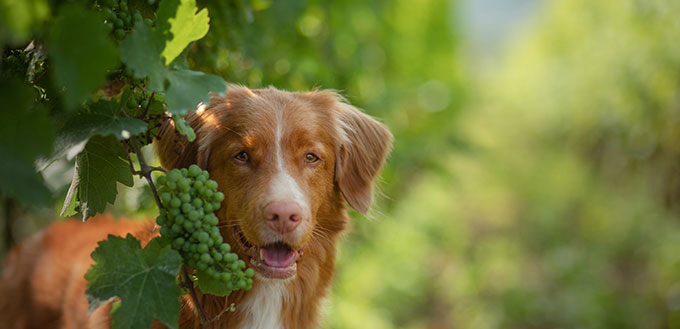Many dog owners often mistakenly assume that most dogs are capable of eating all the same people foods that we are. After all, grapes are fruit, and fruit is healthy right? However, if your dog eats grapes you should know the risk to their health that comes along with it. As it’s not quite as black and white as it may seem, and grapes are actually quite dangerous for your pup to consume. Here we’ll be answering the important questions about grape consumption in dogs, like can dogs eat grapes? And what to do if your dog eats grapes accidentally.

Can Dogs Eat Grapes?
The simple answer to this question would be no, dogs should not be eating grapes for a number of reasons. In fact, dogs shouldn’t eat grapes OR raisins (which are just partially dried grapes). There is no form that a grape can be served in that would be suitable for your pup, that included peeled or seedless grapes as well.
This is worth noting as many people make the assumption that it is the seeds that are the issue (much like with apples), however, it is the entire fruit.
Are Grapes Poisonous to Dogs?
Grape poisoning is a very real threat when it comes to letting your dog eat grapes or raisins. Grapes and raisins are highly toxic and can result in severe symptoms, or even death if left untreated. Whilst the extent of grape and raisin toxicity is not fully understood, and the symptoms can vary from dog to dog, much as they would with humans, it’s not worth the risk of even a single grape.
You must also be mindful that this is not limited to a single type of grape. Green, red, purple grapes are all equally toxic if ingested.
Can A Single Raisin or Grape Be Toxic To Dogs?
Any number of grapes has the potential to cause serious harm to your canine friend. Though toxicity levels can start to become dangerous once your dog has eaten a few grapes. However, if they have a particularly delicate stomach or digestive system then one grape could be enough to trigger a reaction. Therefore you should avoid giving your dog even a single grape.

What is Grape Poisoning?
Grape Poisoning comes as a direct result of your dog consuming grape juice, grape products, fresh grapes, or raisins. A letter recently published in the Journal of the American Veterinary Medical Association (the April issue), addresses grape toxicity and the possible causes. This letter suggests that grape toxicity could be caused by tartaric acid, should this prove to be true it would be monumental in opening doors for better treatment of dogs suffering from the potentially fatal after-effects of eating grapes.
However, this is still undergoing further study. Therefore, as of yet, the toxic substance in grapes and raisins is officially unknown. Though there are several other theories that have cropped up over the years to try and explain exactly what causes this potentially fatal reaction in dogs that have eaten grapes. All of which have been discredited over the past couple of decades following in-depth study.
Symptoms of Grape Poisoning
Understanding the symptoms of the toxic reaction can help you to know when your dog is in danger of falling ill as a result of eating grapes. The full list of symptoms can be quite extensive, and we have included everything so that you can fully understand the extent of grape toxicity:
- Excessive thirst (polydipsia)
- Dry nose/dehydration
- Reduced Appetite
- Lethargy or weakness
- Irritability
- Tenderness around the abdomen
- Vomiting
- Diarrhea
- Difficulty with urination
- Kidney failure
- Azotemia (kidney damage)
- Trouble breathing
- Hypercalcemia (elevated calcium levels)
- Hyperphosphatemia (elevated phosphate in the blood)
- Anuria (red blood cell deficiency)
- Abdominal pain
- Pale gums
- Loss of body weight
What Are The Early Signs of a Toxic Reaction?
Within a few hours of ingesting the grapes, you may start to notices some of the early onset signs of grape poisoning. Knowing the early symptoms can help you to know how severe the reaction is and whether you will need to seek the help of your local veterinarian. The symptoms include:
- Vomiting
- Digestive distress
- Dehydration
- Lethargy/irritability
If your dog vomits, then it is a clear indicator that their body is trying to remove a foreign substance. Even large dogs can be affected by grape poisoning, in fact, large dog breeds can react to as little as a single grape or raisin. It is not a matter of size, it’s a matter of digestive ability.
If your dog is drinking a lot but still appears dehydrated, this is another indicator that something could be wrong. You can check if they are dehydrated by pulling up the skin at the back of your dog’s neck. If it takes a while to get back into place, it means your dog is likely dehydrated.
Lethargy and irritability can be caused by a lot of things, and so this symptom alone may not be indicative of your dog being poisoned. However, if you notice any other symptoms that seem to have happened alongside it, then this behavior could be letting you know there is a problem.

When Should I Go To The Vet?
Should you have any suspicions that your dog may be suffering from gape toxicity, you should go to your vet immediately. Acute kidney failure is the biggest danger when it comes to grape poisoning, and no it is important that you seek the proper care for your dog as quickly as possible. The vet surgery can then induce vomiting in an attempt to get the grapes out of your dog’s system and monitor them for signs of poisoning.
What Treatments Will Be Used?
Should the severity of the reaction require immediate treatment, there are a few things your veterinarian can do to try and help your pup flush the toxins from its body, especially your dog’s kidneys and stomach.
- Activated charcoal
- Induce vomiting
- Intravenous fluids
- Serial blood work monitoring
- Anti-emetics
- Urine output monitoring
- Blood pressure monitoring
The Importance of Treatment
Any or all of these treatments will be undertaken to reduce the risk of acute kidney failure, which if left untreated can be fatal or cause lifelong problems. Once kidney function is impaired, your dog will then struggle with urine production. Difficulty with urine production can lead to urine retention, UTIs, and multiple other complications.

Can I Treat Grape Toxicity at Home?
No. Grape toxicity needs to be properly treated by a professional in order to fully flush out any toxins. If your dog has eaten grapes in your presence and you have been fortunate enough to notice at the time, you should notify your vet immediately. If it is too late to call the vets, or your dog ate grapes on the weekend you can contact the local pet poison helpline or emergency vet to seek immediate advice on how to proceed.
How Can I Stop My Dog From Eating Grapes?
As a worried dog owner, you may find yourself wondering how best to avoid the possibility of your dog eating grapes, or even grape or raisin products. Responsible pet owners will take every precaution to prevent their dogs from getting to grapes. This includes putting the fruit bowl out of reach (the back of the work surface tends to be a safe bet).
Additionally, if you have a young child that likes to feed their food to the dog during meal times, you should leave your dogs out of the room where grapes or raisins are involved – that includes products that may contain grapes or raisins such as scones, or fruit cake. Dogs eat whatever they can get, it is up to you to ensure they don’t chow down on the wrong thing.
So to answer the question of “can dogs have grapes?” the answer is no. Absolutely not. By no circumstances should your dog be fed grapes, nor should grapes, raisins, or grape products be left where your dog can get to them. They are incredibly toxic to dogs and should be avoided at all costs.
Note: The advice provided in this post is intended for informational purposes and does not constitute medical advice regarding pets. For an accurate diagnosis of your pet's condition, please make an appointment with your vet.










